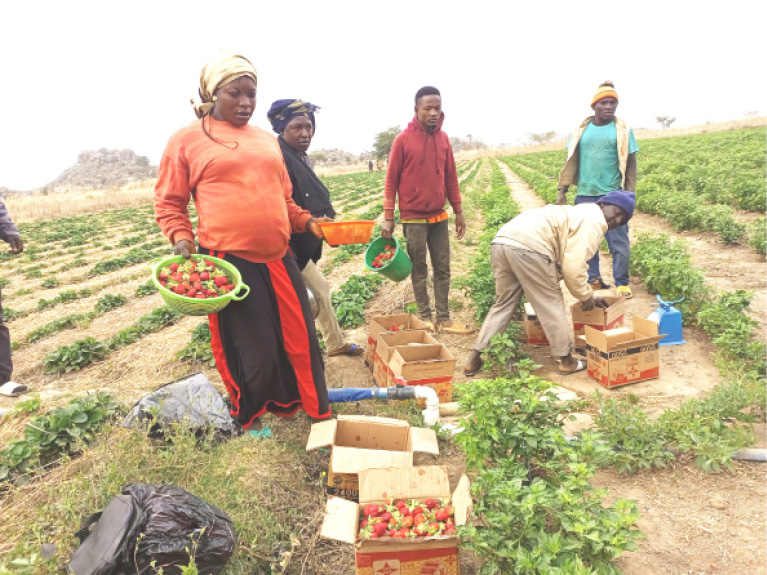Strawberry farming changing lives, lifting families in Chaha
Christopher Choji and his son Elvis have been cultivating strawberry for over five years in Chaha Community in Vom, Jos South area of Plateau State. He has seen Elvis successfully graduate from the Federal College of Land Resources and Technology Kuru, Plateau State while Elvis’s elder brother, who Daily Trust met on the farm some […]

Mr. Choji (2nd right) and his family arranging their harvest for on delivery to his customers
Christopher Choji and his son Elvis have been cultivating strawberry for over five years in Chaha Community in Vom, Jos South area of Plateau State. He has seen Elvis successfully graduate from the Federal College of Land Resources and Technology Kuru, Plateau State while Elvis’s elder brother, who Daily Trust met on the farm some years back, is now studying overseas.
Through these years, Choji and his family have expanded their strawberry cultivation from a small plot to about two hectares, located about 100 meters apart, which they hope to expand even further.
At the peak of production, Elvis said they are likely to harvest about 2000kg, which is about two metric tons from one of the farms. But for now, harvest has just begun, and they do about 400kg weekly.
Currently, a kilogramme of strawberry at the farm gate is sold at N1,500 and each carton contains between 5kg and 6kg.
The family has also delved into the production of other vegetables like broccoli, lactose and pepper and their income is rising.
Every morning Choji and his boys go to the farm and, unlike in the years gone by, harvest in some cases is now daily based on demand from his network of customers in Abuja, Kano and other parts of the country.
But the farmers want to have companies and other stable off-takers to enable them to have a more viable and sustainable supply chain.
“We made an attempt to engage WAMPCO and NASCO to off-take the strawberry from our farmers but they told us our product is too expensive. So we now rely on some of the individual buyers in Abuja, Kano and other places. The day they don’t want to buy, you have no one else to sell to,” Christopher Choji said.
Unlike the Chojis, Matthew Victor Gyang and his brother Ezekiel have been working together to produce strawberries yearly and their farm has grown from an acre to about 2.5 hectares.

Mr Matthew saved over N3 million and travelled to Israel to acquire more knowledge on the cultivation of strawberries and other vegetables.
He has stepped down the knowledge to some young farmers in the community since returning home before the outbreak of COVID-19.
Through the knowledge Mr Gyang acquired in Israel and stepped down to his people, most of the farmers including Choji and his family are now using drip irrigation system.
Explaining how he ended up in Israel, Mr Gyang said: “It was a challenge that I took because most of our farmers today are discouraged. Some of them are saying that farming is a local thing.
“In fact, for almost a year, I had to save money. I knew it will cost me money but the knowledge I gained there was quite impressive; even if I spend 20 years in farming, I will not worry because of the knowledge I gained there. So I don’t bother about the money it cost me as the knowledge I got is worth it.
“I have gained more experience, most especially in the area of drip irrigation system that we are not used to here. You know how to water your farm and how to make sure the fruits are okay, so I have to travel all the away from Jos to Israel to undergo some research about strawberry production,” he said.
At the moment, Gyang harvests over 300kg and is likely to do two tons at the peak of harvest. He has also equipped himself with facilities to extend the shelf life of strawberries to meet his customers’ demands.
Despite the successes, the farmers face challenges of the cost of fertiliser, herbicides and even the shrinking of the mini dam that supplies water to their farms.
“I can recall that in 2012, 2013 fertiliser was N2,500, N3,000, N4000, the highest was N5000, but now we buy Urea at the rate of N15000, and 15:15:15 – that is nitrogen, phosphorus, potassium – is N16,000 instead of N3,000 which is many times over what it used to be,” Matthew Gyang said.
Some of the farmers apply fertiliser twice a week, spending an average of N62,000 weekly on fertiliser alone on their farms – an expenditure which, they said, is eating deep into their profit.
As they grow their farms, the farmers are calling for government involvement in terms of creating the needed market and engagement with recognised off-takers so that consumers and makers of strawberry-flavoured drinks can off-take the produce.
“We don’t have support from government at all. We have even tried our best to go to the state government; we have registered as a farming association, the Ministry of Trade and Investment has even called us to Abuja but nothing came out from there.
“So that is the most challenging thing because it all affects us, the risks and gains are all ours,” Gyang said.
